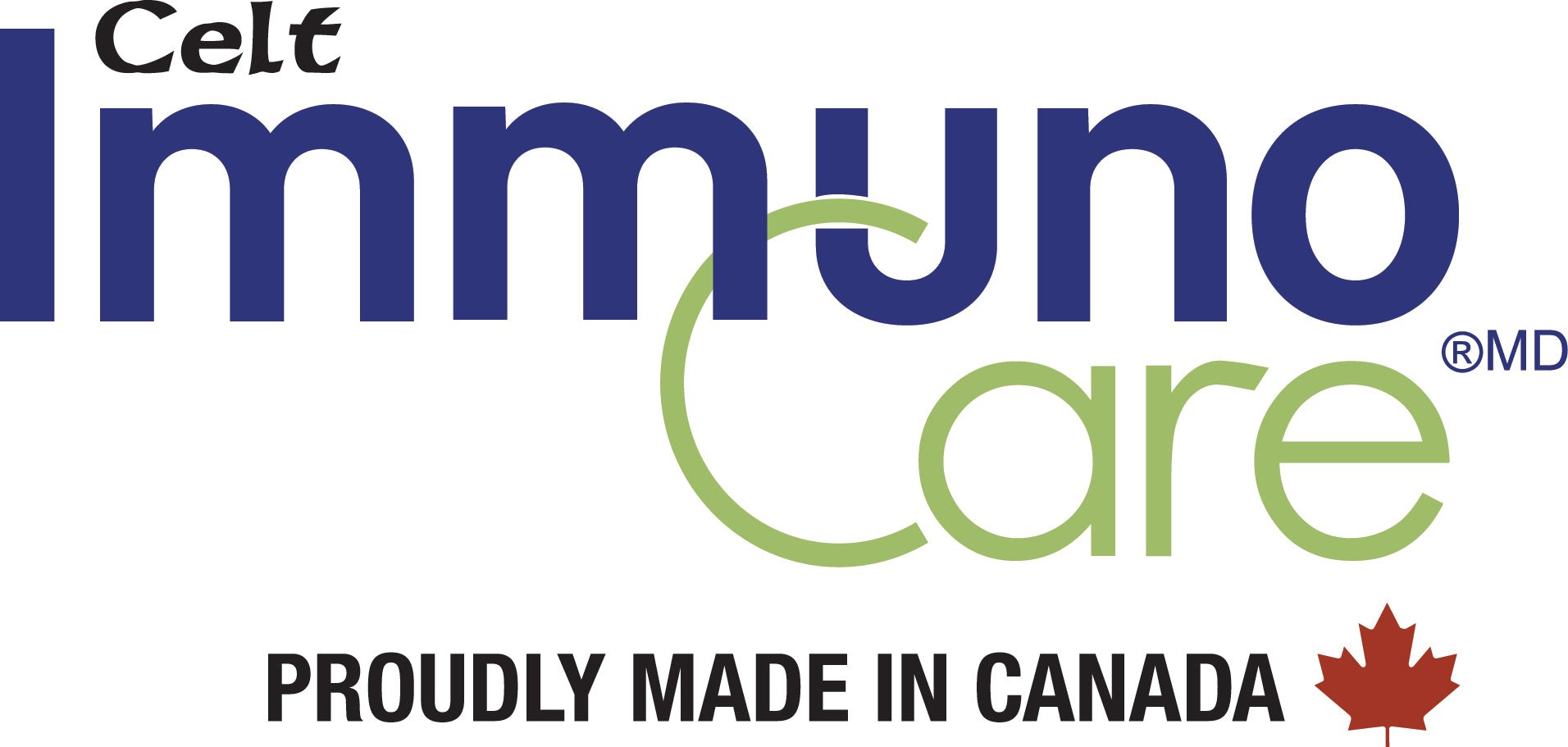
IMMUNE PARAMETERS STUDY – CELT NATURALS IMMUNO-CARE®CONDUCTED AT THE UNIVERSITY OF GUELPH, BY THE HUMAN NUTRACEUTICAL RESEARCH UNIT
Protects immune cells from the effects of oxidative damage and increases protection of the fat in body tissue from damage.
Cellular antioxidant protection by Immuno-Care.
Abstract
The objective of this study was to perform an assessment of the antioxidant protection provided at the cellular level by the product Immuno-Careô. The CAP-e bioassay using human erythrocytes was used for this testing, aimed at assessing one important aspect of bioavailability. The water-soluble and water-insoluble components of Immuno-Careô were tested in parallel. The data showed a dose- dependent protection against intracellular oxidative damage, verifying that antioxidants in Immuno-Careô were able to protect living human cells from oxidative damage.
Dr. Gitte S. Jensen, PhD1. Immunology Research NIS Labs, Oregon, USA
The ingredients include multiple immune activating and anti-inflammatory properties that protect blood cells. Proven bioavailability of the product was important factor in making sure these compounds enter the system and not get destroyed. Not all antioxidants protect cells, some don’t enter the cell membrane. Study showed 50% inhibition of cellular damage and capable of providing meaningful protection to living human cells.
Protects immune cells from the effects of oxidative damage and maintains healthy skin and connective tissue formation. Helps maintain normal function of the thyroid gland.
Thyroid hormones have also been shown to potentially affect NK cell cytokine production. T3, for example, can induce IL-2 receptor expression in peripheral blood mononuclear cells
Immune Modulating Effects of Immuno-Care
The study was conducted on the product Immuno-Care, containing a blend of antioxidants, essential fatty acids and anti-inflammatory compounds which support the immune function, and recovery from fatigue syndromes. Test the specific aspect of immune activity-namely immune modulation and effects on NK cells. NK cells are cytotoxic lymphocytes that target infected, stressed, or transformed cells, and play a critical role in bridging the innate and the adaptive immune responses.
The method we used to perform these tests is important. It allows measurement of antioxidants that can cross the lipid by-layer cell membrane. Not all antioxidants can enter the cell membrane or may even damage the membrane. We observed a reduced florescence intensity of RBC that indicates the Immuno-Care contains antioxidants available to penetrate the cells and protect from damage. The body’s primary defense towards cancers and viral disease involves natural killer (NK)-cells. These cells travel in our blood stream in a state of rest but can be immediately recruited into tissues by chemical signals and activated through various mechanisms to kill cancer cells, divide, and make more NK-cells and secrete substances that attract other cells into the site. The molecule CD56 plays a role in NK cell function. The data collected expresses high levels of this marker.
The tests show the promising effects of Immuno-Careô on the expression CD69 on NKT cells. This small subset plays an important role in regulating the immune system.
The data collected served as a pilot study to determine further work on the products ability to modulate immune response, and to consider the data for publication. Thyroid hormones have also been shown to potentially affect NK cell cytokine production. T3 can induce receptor expression in peripheral blood mononuclear cells.
Used in herbal medicine to relieve pain, swelling and inflammation. Acts as digestive enzyme. Helps to maintain the immune function and support the system. Helps maintain connective tissue formation. A factor in normal growth and development. Maintains good health.
Pilot Study Conducted
at the University of Guelph, by the Human Nutraceutical Research Unit on The Supplement Immuno-Careô
Human Nutraceutical Research Unit, J.T. Powell Bldg. University of Guelph
Guelph, Ontario, Canada N1G 2W1
Randomised double blind, placebo controlled clinical trial to determine the effects of Immuno-Care containing plant sterols, antioxidants, and essential fatty acid complex, on specific immune parameters and cardiovascular indices in men and women with non-food allergies.
The study focused on allergic reactions to airborne allergens, grasses, various weeds and other pathogens. Subjects came in for baseline testing day 0) and returned on day 7 of the study and again on day 28, the last day of the study. On the initial visit, height, weight and a blood sample were taken. Blood was analyzed for complete blood cell count (CBC), plasma DHEA, Cortisol, total HDL and LDL-cholesterol concentrations, and triglycerides. A Quantikine high sensitivity Elisa kit was used in order to measure human IL-6 in the plasma collected. Throughout the study, subjects were required to complete a daily journal listing specific allergy symptoms, non-allergy symptoms and any medications taken during the supplementation phase.
Allergies
Basophils play an important role in allergic inflammation. Mast cells and basophils express the high affinity receptor for IgE (FcepsilonRI) and play a central role for IgE-associated immediate hypersensitivity reactions and allergic disorders. During allergic reactions, basophils migrate from the blood compartment to inflammatory sites, where they act as effector cells in concert with eosinophils. Basophils release histamine during inflammation and allergic reactions. The study reduced basophils by 69% reducing symptoms of allergic reaction, like runny nose, itchy eyes, headache. The IgE immunoglobulin came down 15% resulting in less allergic symptoms.
The trail results showed statistical significance in reducing the inflammatory cytokine IL-6 by approx. 25%. IL-6 is involved in both immune responses and in inflammation throughout the body. IL-6 is now recognised and seen as chronic inflammation, closely related to chronic inflammatory diseases. Some of the common ones are diabetes, allergies, upper respiratory conditions like sinusitis, rhinitis, CVD, arthritis, psoriasis, Chron’s, celiac, asthma, IBS, fibromyalgia. IKL-6 is now associated with the “cytokine storm” associated with Covid 19. IL-6 is also plays a role in various cancers, TNFa-tumour necrosis factor alpha, NF-kB-nuclear factor kappa B. Both are pro-inflammatory responses.
Cardiovascular Health
The effects of Immuno-Care on lipid and lipoprotein parameters reached statistical significance. Reduced LDL cholesterol (bad cholesterol) 15%, increased HDL (good cholesterol) 9%. The specific objective of this portion of the trial was to determine the effects of the supplement Immuno- CareTM on blood lipid parameters. Significant reduction was noted in the overall LDL levels of the treatment group from day 0 to day 28. Perhaps what is more interesting is the increase in HDL levels, compared with a relative decrease in the placebo group.
However, it is the ratios of various lipids and lipid pro- teins rather than the absolute values that are important in assessing cardiovascular risk, and consequently these ratios were calculated and tabulated.
A significant decrease in the ratio of TC/HDL, and in the ratio of LDL/HDL cholesterol, in the Immuno- Careôgroup, was noted. A decrease in these ratios corresponds to an associated decrease in the risk of cardiovascular disease (CVD). These ratios are markers for a reduction in the risk of developing atherosclerosis. Consequently, it is our opinion that these results indicate that Immuno-Care could be very beneficial to the health of hypercholesterolemic individuals at risk of developing CVD
Conclusions
Immuno-Careô and its components influence immune parameters and in basophil and IL-6 levels. Given these changes, Immuno-Careô would appear to have the potential to substantially alleviate allergic responses.
Immuno-Careô could also have an effect in auto- immune diseases such as Crohn’s disease or rheuma- toid arthritis, or in the ability of subjects to resist the common cold virus, although studies on these populations would be required to verify possible beneficial effects.
This study verified that Immuno-Care supplement is effective in reducing circulating levels of LDL-cholesterol and increasing circulating levels of HDL cholesterol. It is of interest to note that there was a significant decrease in the ratio of TC/HDL, and in the ratio of LDL/HDL cholesterol, in the Immuno-Care group. A decrease in these ratios corresponds to an associated decrease in cardiovascular disease (CVD) risk because these ratios are markers for a reduction in the risk of developing atherosclerosis. Consequently, these results would be of considerable benefit to the health of hyper- cholesterolemic individuals at risk of developing CVD.
Clinical studies on the components of Immuno-Care indicate that there are few adverse effects. Furthermore, the components of Immuno- Care do not appear to be associated with any mutagenic or genotoxic activity.
